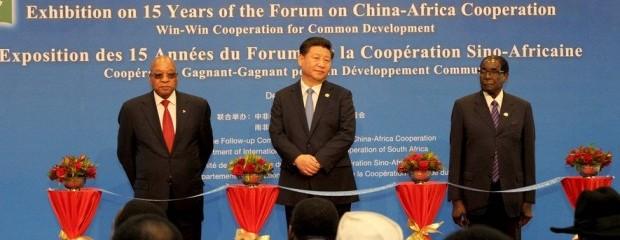“What does mainstream even mean?” 2020 AKO Caine Prize nominees (III)

In the final instalment of our three-part interview, we talked to the writers about their shortlisted stories and their style.

Welcome to Part III of our interviews with the 2020 AKO Caine Prize nominees.
You can read Part I, on joy and writing, here. You can read Part II, on the politics of prizes and reading, here.
The shortlisted writers and stories are:
- Erica Sugo Anyadike (Tanzania): How to Marry an African President.
- Chikodili Emelumadu (Nigeria and UK): What to do when your child brings home a Mami Wata.
- Jowhor Ile (Nigeria): Fisherman’s Stew.
- Rémy Ngamije (Rwanda and Namibia): The Neighbourhood Watch.
- Irenosen Okojie (Nigeria and UK): Grace Jones.
Erica Sugo Anyadike
What do you take from being a screenwriter that helps in writing short stories and vice versa? Are the processes the same or do they differ?
Writing for the screen, you’re encouraged to think more about how to present only what you can see or hear. So your sensory depiction is visual or aural. The inner life of characters is hinted at or alluded to, but you never hear an interior monologue or have direct access to their thoughts. That’s not necessarily a bad thing because it encourages you to think about choices. If I want to present someone who is depressed, for example, how would I show the setting around them? What does their bedroom look like? Are there mouldy dishes? What do they look like? Are they unkempt? In writing, you have a lot more to play with but both mediums require you to examine choices. Film and television are also a lot more collaborative. Writing is something that you can do yourself, you can execute your vision exactly how you want it. Writing is word painting and also, world painting and because you are solely responsible for it, it’s up to you to acquire the tools to help you depict the lives of your characters exactly how you want them.
Chikodili Emelumadu
You’ve once said: “People are so entrenched in their view of what is African that they can’t reconcile a story about people sitting in a café…I am through feeling guilty that my version of African is so different from everyone else’s.” How did this guilt influence your writing? At what point did you overcome it?
I wrote some godawful pieces, that’s what happened. They were full of lies and what I thought an African story should be. There was no truth to them and they went nowhere. As soon as I finished each piece, I’d feel as if I’d smeared my soul with someone else’s excrement and everything in my head would be jumbled up and oily. Those were terrible times. Nowadays, I don’t give a shit. Each story’s voice and form is unique, and part of growing as a writer is recognising and accepting this. For now, I write my “conventional”, and I know this resonates with many people because it is their “conventional” as well. If you believe that this world is not all there is, then I write for you. Everything in this world is touched by otherness, the possibility of more out there. It influences everything we do: our pursuit of happiness, of meaning. The very essence of the human soul yearns for the unknown no matter how solid the known world is. I’m just more accepting of this fact. I should add, however, that I didn’t realise I was writing in genre. Other people seemed to think so and now I have the label. Isn’t mainstream a genre too? What does mainstream even mean and who is it for, really? A decade ago I bought the original Grimm fairy and folktales. In it, the story of Cinderella ends quite differently than in the Disney version, for Cinderella’s stepsisters, in order to fit their feet into the glass slipper, cut their toes and heels off with a sharp knife. Glass, rigid and unyielding, cold and shiny. How many people’s feet would realistically fit? Those shoes were made to fit just one person. Cinderella. There are lots of other shoes, all shapes and sizes and colours and fits! Why limit yourself just so you can marry the prince? He doesn’t have two penises or two brains. I’d rather just wear some other shoes and live happily ever after. If mainstream wants me, it can jolly well keep up. I’m not going to be hobbled by glass slippers.
Your story focuses on heterosexual liaisons, while same-sex ones are frowned upon. If science fiction is to help us escape reality, why can’t the LGBTQ folk catch a break even here?
Anytime I read “Both genders” at the start of my story, I cringe because of course there aren’t just two. I was careless with this fact. I wrote this story a few years ago because I was disturbed by the way Nigeria and other African countries treat people we perceive as other, by the fourteen-year jail term for gay association, increasingly malevolent religion, by cultural shifts. I grew up seeing men hold hands and now, they’d probably get beaten up and set on fire. I wanted to present all of this, to be true to what was happening at the time – and what has continued to happen. Nobody catches a break in this story but I wouldn’t want to make it a habit for the LGBTQ community to get short shrift in my work, just because they are.
Are you concerned that some readers might start to identify as Mami Wata? Is there anyone you know of whom you are suspicious? Or perhaps this was your intention all along?
What, like some sort of evil mastermind? I wish! If you’re reading this and self-identify as a Mami Wata, or any Wata entity, DM me on Twitter! I’d love to hear from you!
Jowhor Ile
In Fisherman’s Stew, there’s the subtext of the otherworldly and of love. How would you describe your relationship to these two things?
As a child, I heard stories told of people who returned briefly or paid sudden visits to relatives in distant places after passing away from this life. I wanted to explore in fiction, the wonder and unease I experienced while listening to those stories. Fisherman’s Stew is about longing and love. I was thinking a lot about my childhood, about different ways of knowing and describing reality.
Your prose has a distinct quality that readers have called “restrained”, “poetic”, “quotidian” or even “an acquired taste”. Are these characterisations you agree with?
I simply set out to tell the story as honestly and as clearly as possible. If I manage on occasion to be coherent and consistent to the point where something that looks like a style emerges and people enjoy it, cool. And if others find it mundane and quotidian, it’s probably because I studied accounting so I’ll take full responsibility. I enjoy writing that cares about language, I like clarity and I bear these in mind when editing a story.
Remy Ngamije
What was most challenging about writing your story about people who you’ve said are invisible, existing on the peripheries?
Writing about invisible people is difficult because you have to make them three-dimensional. People have an inherent dignity in real life, so they should have it on the page. People have hardships and humour in the real world, so they should have it in fictional dimensions. Writing about invisible people is challenging because if you gaze at them too hard with your pen then the writing becomes unfair scrutiny, and if you do not look hard enough you miss important details and the writing becomes careless. The hardest part about writing The Neighbourhood Watch was overcoming a personal sense of heroism, like I had “saved” people through the writing. I merely created a literary moment as an African writer for an African reader in which we could encounter our reality and agree on whether what was written and what was read were in congruence. That is all I can do as a writer: be an arbiter of reality — a position of weakness. The reader, however, is infinitely more powerful: they are the administrator of reality — they can change this reality in which The Neighbourhood Watch is set.
Irenosen Okojie
Toni Morrison once said of not writing to fit the mainstream, “I stood at the edge…And let the rest of the world move over to where I was.” Your work also seems to be written from the edge. When did you realise you could stand at the edge? What gave you permission?
It’s amazing that you bring up Toni because Toni is the one that showed me the way. The reason for that is, obviously, I always had this sort of slightly eclectic perspective on stuff. And I’m a big Toni Morrison fan. I was reading her interviews when I was younger and I read a quote where she said, “if there’s a book you want to write that isn’t out there, write it into existence”. Something along those lines. And that really stayed with me because I thought, that’s what I want to do. I want to write the kind of books that I would have loved to read. And the fascinating thing about being at the edge, the periphery, is that people don’t see you coming. In a way, you always have this kind of quiet assassin thing about you. People expect other things. So that allows you to kind of quietly work on your craft, feed yourself and also seek out other voices that make you feel empowered in that space. And that’s one of the things I did, seeking out people like the Amos Tutuolas, the Toni Morrisons, you know, the Bessie Heads, people that just gave me that sort of courage. It made me feel like this is my natural path and I’m not gonna veer away from it just because it’s not the popular thing. Just because something is popular doesn’t mean it’s always going to be.
Do you worry that readers might not quite understand your experimental style or might take some time to settle into your work? Do you see your brand of literary experiment as a risk?
For me, it’s more about the risk as an artist. Personally, I just want to be challenging myself as a writer. So that’s kind of part of my ethos. There’s something about creating a world with no boundaries that speaks to me as a writer, because then I get excited about coming to the page. If I feel like I’m coming to the page, and I’m treading over old ground, in a sense, it doesn’t really do anything for me. I would consider myself an experimental writer. I don’t get offended by that or upset about it, because it just depends on how you see it. Some people will say, oh, yeah, you know, the work is experimental, but it’s still accessible. Others will say the work is experimental, and I really just don’t get it, it’s just not for me. I completely understand both perspectives.
These interviews have been edited and condensed for clarity





